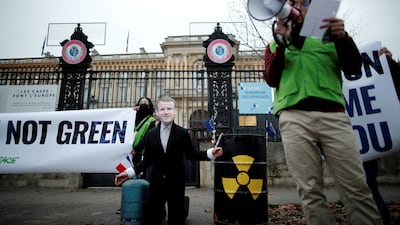Britain on Tuesday backed France’s push to put nuclear power at the heart of Europe’s clean energy revolution.
UK minister Andrew Bowie said atomic energy “has a crucial role to play” as Britain joined a 16-member “nuclear alliance” in Paris.
Members of the alliance said the UK could "positively impact the EU supply chain" as they aim for a 50 per cent increase in nuclear capacity by 2050.
The group is lobbying for fission to be included in green energy plans across Europe.
They are opposed by a club of anti-nuclear countries such as Austria and Germany, who want to focus on renewables such as wind and solar.
Nuclear power “is absolutely indispensable if we want to reach our climate ambitions,” said France’s Ecology Minister Agnes Pannier-Runacher.
At the talks on pooling efforts to build more reactors, she said she was delighted to welcome the UK as “a country that is re-engaging” with nuclear power.
French energy company EDF is building two reactors at Hinkley Point C in south-west England, set to provide the UK’s first new nuclear capacity in more than 20 years.
Another two reactors are proposed for the Sizewell C site on Britain’s east coast.
Mr Bowie, the UK minister responsible for atomic energy, reported “very positive” talks with French officials overseeing new nuclear projects.
“As two of the first nuclear powers, between us we are set to co-operate even more closely as we develop and invest in new nuclear projects,” he said.
“Able to run day and night, nuclear has a crucial role to play in strengthening Britain, and Europe's energy security, while boosting our economies and jobs.”
The UK-France talks come amid a wider rapprochement between London and Paris following a revised Brexit deal in February.
France is one of the world’s biggest atomic energy generators and gets almost two thirds of its electricity from nuclear.
Its nuclear grid was plagued by maintenance problems last year that exacerbated an energy squeeze in Europe.
But President Emmanuel Macron is backing a nuclear “renaissance” to boost Europe’s energy independence after Russia’s invasion of Ukraine.
Britain and France are both interested in next-generation miniature nuclear reactors touted as a possible power source for factories or remote islands.
Finland last month began operating Europe’s first new nuclear plant in 16 years in a move credited with slashing electricity prices, while Belgium has delayed a nuclear phase-out by 10 years.
At EU level, pro-nuclear countries recently won a carve-out from Europe-wide renewable energy targets.
It means their targets will be less steep if they make hydrogen by means other than fossil fuels, meaning nuclear.
However, the momentum for nuclear has not extended to Germany, which switched off its last three reactors last month, or Austria, which is leading the charge against fission’s inclusion in EU climate plans.

Nuclear power’s opponents say it takes too long to build, comes with unacceptable safety and environmental hazards and is not renewable because uranium must be sourced from countries such as Russia that have it.
“Every euro invested in new nuclear will not be invested in the energy transition,” Pauline Boyer, a campaigner at Greenpeace France, said as ministers met in Paris on Tuesday.
“France, like Europe, must make a big shift towards restraint and energy efficiency, and the massive development of renewable energies to move away from fossil fuels.”
Supporters of nuclear say it operates under high safety standards and is reliable in any weather.
Ms Pannier-Runacher said 90 per cent of France’s nuclear sub-contractors were from Europe.
“It is an energy that is totally sovereign in Europe, unlike many other energy sources. For example, I think we depend on China for photovoltaic panels,” she told French television.


